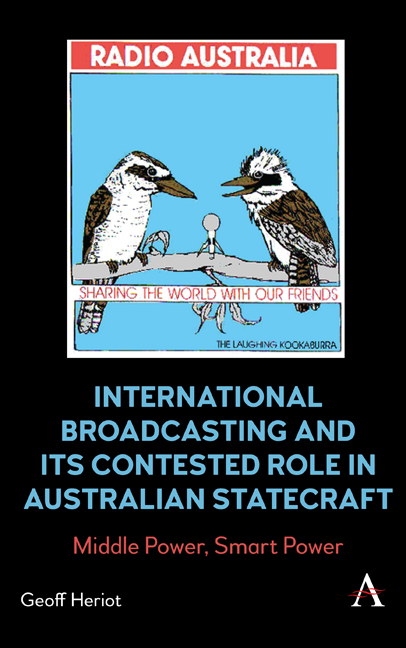 International Broadcasting and Its Contested Role in Australian Statecraft
International Broadcasting and Its Contested Role in Australian Statecraft Book contents
- Frontmatter
- Dedication
- Contents
- List of Figures
- Foreword
- Acknowledgements
- Chapter One Introduction
- Chapter Two Media and the Contest of Ideas
- Chapter Three International Broadcasting and Its Discursive Properties
- Chapter Four Mobilising ‘Softer’ Power in a Hard World
- Chapter Five Australia’s ABC: State Interests, National Evolution
- Chapter Six Purpose, Performance and Evaluation
- Chapter Seven Modernising the ABC
- Chapter Eight Policy, Priorities and Qualified Independence
- Chapter Nine Engaging with Intercultural Audiences
- Chapter Ten Indonesia, the Crucible
- Chapter Eleven Strategic Contingency and War
- Chapter Twelve Looking to the New Disorder
- Index
Chapter One - Introduction
Published online by Cambridge University Press: 15 November 2023
- Frontmatter
- Dedication
- Contents
- List of Figures
- Foreword
- Acknowledgements
- Chapter One Introduction
- Chapter Two Media and the Contest of Ideas
- Chapter Three International Broadcasting and Its Discursive Properties
- Chapter Four Mobilising ‘Softer’ Power in a Hard World
- Chapter Five Australia’s ABC: State Interests, National Evolution
- Chapter Six Purpose, Performance and Evaluation
- Chapter Seven Modernising the ABC
- Chapter Eight Policy, Priorities and Qualified Independence
- Chapter Nine Engaging with Intercultural Audiences
- Chapter Ten Indonesia, the Crucible
- Chapter Eleven Strategic Contingency and War
- Chapter Twelve Looking to the New Disorder
- Index
Summary
Once, but no longer, Australia figured prominently in a ‘Great Game of the Airwaves’ (British Council 2013) played by nation states in an increasingly media-dense – though asymmetric – world. It is a game not only for great powers but also for lesser ones, executed via broadcasting and associated digital media platforms. The great states have the military and economic power to impose their will and shape the world order. By inverse proportion to their military and economic status, all others represent and defend their legitimacy and vital interests through influence and persuasion. They seek ‘virtual enlargement’ (Chong 2010, p. 384) by shaping and influencing the beliefs and conduct of other actors. Resorting to various forms of organised persuasive communication (Bakir et al. 2019), they have engaged not just other government entities and multilateral institutions but also politically significant publics and private persons.
Australia has operated state-funded international broadcasting platforms since 1939 – at first radio, later television and digital media – principally through the Australian Broadcasting Corporation (ABC). In Southeast Asia and the Pacific, Radio Australia at one time rivalled the audience reach and reputation of global behemoths, the BBC World Service (BBCWS) and the Voice of America (VOA). Radio Australia could reach audiences and prosecute Australian narratives even in jurisdictions where it was not wanted by local authorities. Despite Radio Australia’s reputed informality and its editorial independence from the government of the day, its core purpose remained intensely political. In the present state of disarray, where conflict is as much ideational as mate-rial, the diminished status of international broadcasting as an instrument of Australia’s discursive power warrants reconsideration.
Usage of the term ‘international broadcasting’ survives from the twentieth century when, as early as 1917, text-based messaging through Morse code and, later, voice radio transmissions (Nelson 1997, p. 1) demonstrated the capacity of state (and well-resourced non-state) actors to reach audiences regardless of geographic or political frontiers. The practice evolved to encompass the provision of state-sponsored news, information and entertainment, directed to publics outside the boundaries of the sponsoring state and delivered via electronic media (Price, Haas & Margolin 2008, pp. 152-153).
- Type
- Chapter
- Information
- International Broadcasting and Its Contested Role in Australian StatecraftMiddle Power, Smart Power, pp. 1 - 14Publisher: Anthem PressPrint publication year: 2023


